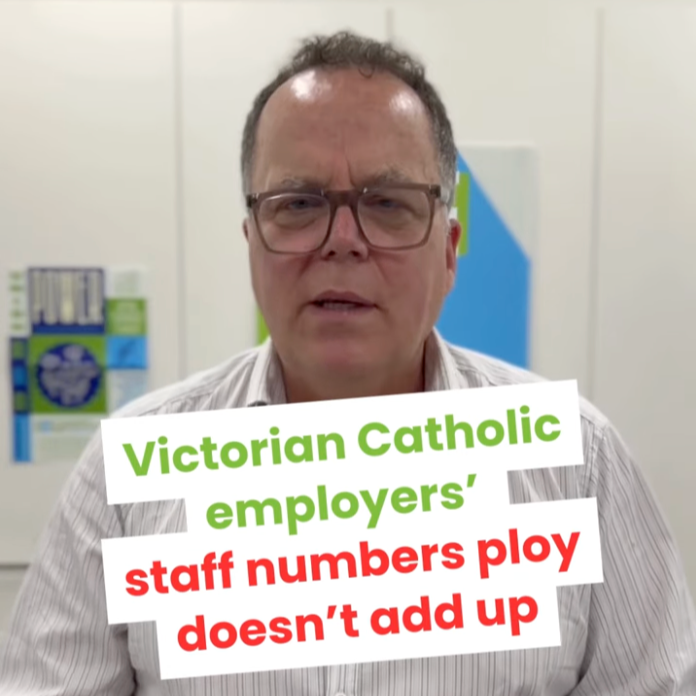Supporting school staff at every stage of their career
Whether you are working in the Catholic or independent sector in Victoria or Tasmania, the IEU is here to help you navigate any difficulties, protect your rights to a safe and fair work environment, and develop your skills as an educator.
Stand with us for better pay and conditions, to improve our industry, and to know that you’ve got help and advice at hand when you need it!
Your employment contract
-
Your contract is a legally binding document outlining many of your conditions of employment, including your rate of pay. If you have been offered a fixed term contract, it is particularly important that you contact your union to know your rights.
Do you have a contract/letter of offer?
Have you contacted the IEU Victoria Tasmania office to check that it meets its obligations?
Have you signed the contract and returned a copy of it?
Your contract should also refer either to an Agreement or an Award, which provides more detail of your conditions. Agreements (including the Multi-Enterprise Agreement covering all staff in Catholic schools) are negotiated between the IEU and your employer, and provide you with improved pay, conditions, and rights. If your school is not covered by an Agreement, the relevant Award provides a basic “safety net” of minimum standards. See the industry-specific detail below.
-
Ideally as a beginning teacher you should be assigned a mentor and given a reduced load.
Many schools have made collective agreements through negotiation with the IEU. This is the first place to look to ascertain your conditions of employment. Below is a link to a list of Enterprise Agreements: an Enterprise Agreement is the most secure and efficient way of improving conditions of employment in your workplace. If your school has such an agreement, it is legally binding. Does your school have an Enterprise Agreement?
If your school is not bound by an Agreement, your employment conditions will be underpinned by the relevant Award, the Education Services (Teachers) Award 2010. This document contains the minimum set of conditions and protections that a school is obliged to provide, and does not represent the industry standard.
-
If you are working as a beginning teacher at a Catholic school, your employment conditions will be contained in one of our Victorian Catholic Education Agreements, which have been negotiated between the IEU and the Catholic education employers. These documents outline your rights at work in relation to such matters as salary, hours of work, teaching load and other conditions
Reduced Load
As a beginning teacher, having a reduced load of face-to-face teaching hours will allow you to prepare your full VIT registration application and also to settle in to your new career.
In Victorian Catholic schools, primary teachers in their first year may be allocated a maximum of 19.5 hours of scheduled class time per week, for secondary teachers the maximum is 16.5 hours per week in their first year.
Additional Qualification and Accelerated Advancement
If you have successfully completed a qualification of Master degree, its equivalent or higher, you will be entitled to advance up the incremental scale by one sub-division (clause 52 of the Agreement) from 1 May following the date on which the extra qualification was attained. Obtaining a second or subsequent higher qualification will entitle you to advance further up the scale. You must notify your employer in writing of the acquisition of any additional qualifications attained and provide satisfactory evidence.
-
In addition to the provision of relevant employment information, schools offering you casual relief work should ideally provide you with opportunities to undertake activities required for you in respect to application for Full Registration. Some of these activities may include classroom observation sessions, collegial activities and meetings.
The IEU runs regular PD conferences for CRT members to assist them to meet the minimum VIT/TRB requirements – check our website for details.
Rates of pay for relief teaching work will vary across independent schools, and are often contained in individual school Agreements (see tab above for further information about conditions in independent schools).
-
We invite all early career teachers (teachers in the first five years of their careers, including CRTs) to participate in a 60-minute PD about their rights and responsibilities at work.
Both members and non-members of the union are encouraged to attend. The session cover legal liability for teachers including duty of care responsibilities, reportable conduct, employment rights, and appropriate use of electronic communication and social media. We also discuss the key issues currently facing new teachers and how the union can support you throughout your career.
The sessions will be facilitated by an IEU officer specialising in issues facing early career teachers. They can take place over an online meeting or in-person at your school. Attendees will receive a certificate which aligns with VIT requirements.
-
Protects your job and your rights at work
Provides you with access to free expert advice, support and legal representation on any workplace matter
Gives you a voice in negotiations with your employer
Helps improve pay and conditions through our collective strength
Ensures both staff and students benefit from a safer, fairer and more democratic teaching and learning environment
Provides access to a comprehensive program of quality training and personal development
Gives you the peace of mind with free legal advice, professional indemnity and legal liability insurance.
As well as providing you with support and advice about all aspects of your work, the IEU uses the collective buying power of our membership to help you save money on the home front.
IEU membership benefits include:
Exclusive access for you and your family to the non-profit Teachers Health Fund
Great bargains, discounts and offers through Union Shopper and Member Advantage
Training and professional development
Referals for free legal advice
-
Teachers in their first year in the classroom are entitled to join at the discounted membership rate of $4.50 a week - an absolute bargain for the support, protection and benefits of IEU membership!
Plus, union fees are 100% tax deductible!
-
In partnership with the Teacher Learning Network, the IEU offers comprehensive professional development webinar programs via the IEU Learning Hub.
Our free member-only webinars are offered live or on-demand and cover a huge range of relevant topics.
We have special stream of sessions tailored to the needs of Early Career Teachers which you can find here. ECTs are of course also welcome to join any of our teacher-focused webinars - find the full program here.
The IEU and you
Your induction program
-
As an early careers teacher you should expect your school to have an induction program in place for you.
Variety – your school induction program should help you build upon your background knowledge and skills through varied forms of assistance
Resources – you should be provided sufficient support and resources; you should be able to work closely with a mentor in your first and second year of teaching.
Workload and support – you should not be given an unreasonable workload; your school should encourage you to build your confidence and strengthen your work practice, respecting your teaching style.Individualised program – The induction program should be developed and resourced according to your need. It is important that you are provided with an overview and a timetable of the induction process.
Provision of information – You should be allocated a mentor teacher who will be regularly available to meet with you throughout the year to provide support. Your mentor will work with you throughout the induction process and in the activities required and recommended to assist you to move from Provisional to Full registration.
Role clarity – Your roles and responsibilities, as well as your Mentor’s, should be clearly defined.
Induction coordinator – Your school may have a staff member who has been allocated responsibility for overseeing the induction program. This is the person you can talk to should you need to raise issues or concerns with someone in addition to your mentor.Professional development opportunities – You should be provided access to appropriate ongoing professional development activities; this includes the provision of information concerning teacher unionism and professional associations. Your mentor should also be provided with the opportunity for professional development regarding their responsibilities in assisting you.
Reduced teaching loads – Ideally you should be allocated a reduced teaching load of not less than two hours per week in your first year of teaching. If appropriate, this could be extended beyond your first year. As an early career teacher you should where possible not be expected to teach curriculum areas outside of your teacher training. Your allocation of classes should support you to build and consolidate your skills whilst minimising planning, assessment and reporting requirements.
Wellbeing counselling – You should have access to general wellbeing counselling services without any reference to professional competence. Most schools should have a counsellor or well-being co-ordinator you can talk to.
-
Your IEU Organiser, sub-branch Rep and OHS Rep are also available to support you. Make sure you know who they are, and do speak to them about any issues, questions or concerns you have.
IEU members are protected and supported through their access to expert industrial advice and legal representation on workplace matters. Contact the IEU today for support and advice.
-
Keep in mind that you cannot teach in a primary, secondary or special education school unless you have registration or ‘Permission to Teach’ through either the Victorian Institure of Teaching (VIT) or the Teachers Registration Board Tasmania (TRB).
Most registration applications are processed in January and February so that you are ready to teach by the start of the school year.
If you have not received your card by the time you are meant to start teaching and your application has been successful, you may be able to access your VIT registration number on the VIT Public Register.
-
VIT organises seminars for PRTs. These run from March to July and teachers only need to attend one after-school seminar over this period.
Make sure you read our PD section for more information.
-
Teachers new to the profession are granted Provisional Registration for a period of up to two years. Full registration requires provisionally registered teachers to have at least 80 days’ experience in an Australian or New Zealand school and to develop evidence to show they meet the professional standards for teachers at the proficient level.
The VIT website contains useful information relevant to provisionally registered teachers (PRTs).
Discuss the registration process with your mentor. VIT provides training for mentors, and it is important that your mentor is aware of their role in the process.





